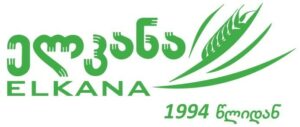
This initiative, led by local farmers’ organisation, ELKANA, aims to conserve endangered indigenous varieties of wheat wiped out by the Soviet planned economy in the 1960s. These varieties are being reintroduced into fields by small and medium farmers for local and commercial consumption.
Name of organisation | Reintroduction of forgotten crops by the Biological Farming Association Elkana |
|---|---|
Year established | 2004 |
Website | Elkana |
Location | Georgia/Regional, focused in the Samtskhe-Javakheti region |
Type of organisation | Farmer organisation working in a network with mills, shops, restaurants etc. |
Key words | Collaborative Short food supply chains; traditional crops; farmers organisations; multi-actor; cereal production; bread production; alternative grain economies |
Thematic focus | Innovative Governance |
What is the ‘Reintroduction of forgotten crops’ by the Biological Farming Association Elkana?
The initiative aims to conserve endangered indigenous varieties of wheat wiped out by the Soviet planned economy in the 1960s. Led by local farmers’ organisation, Elkana, these varieties are being reintroduced into fields by small and medium farmers for local and commercial consumption.
Elkana is a Biological Farming Association that was founded in August, 1994. The organization unites member farmers from different regions of Georgia. At present Elkana works with more than 2,000 farmers from different regions of Georgia. Elkana aims at improving the social-economic state of the population of Georgia and protecting the environment through the development of sustainable organic farms and increasing self-reliance of the local communities.
One of the areas of work of Elkana is to support the reintroduction of traditional/local wheat varieties. These varieties of wheat are well adapted to local conditions, so they enable farmers to generate additional income in rain-fed agricultural systems. Currently a number of farmers have started production of local wheat varieties on a larger scale, for commercial purposes.
There is a growing interest in indigenous wheat varieties in the country. On March 25, 2019, Georgian wheat was granted national significance and the country has petitioned for Georgian wheat to be put on the UNESCO Safeguarding ‘Intangible Heritage List’.
Who is involved in the ‘Reintroduction of forgotten crops’ and what role do they play?
Elkana coordinates the work. Most of the farmers involved have around 1 hectare of land, but some have up to 10. Through the work of Elkana, in collaboration with farmers and various local business, the wheat produced goes to local mills and supplies local restaurants, bakeries, organic shops and farmers’ markets.
Elkana runs an online shop consolidating the sales. Elkana holds a biannual meeting of its member farmers and provides the information about its activities, including on the varieties indigenous wheat being used in the network.
Participating farmers play a crucial role in enabling this system to grow: after harvesting they return 150% of the received volume of seeds for Elkana to further distribute to other farmers. This means more farmers have the opportunity to be involved and this gradually increases the total land area on which local varieties of wheat are grown.
What are the main challenges?
In comparison to the modern wheat varieties, the Georgian varieties have a lower yield. It is therefore difficult for farmers to adopt these varieties, since they are under a lot of financial pressure from the low prices they receive. As a result, the development of the network has been slow. However, farmers still want to grow this wheat for the taste, its adaptability to local conditions, it’s role in the cultural heritage of the country and because it is fresh, local and healthy.
Earning a fair and decent income whilst growing fresh and healthy food is increasing difficult for farmers because of lack of supporting policies at a local and national level.
What are the priorities?
Farmer training & consultancy are a key part of Elkana’s work in reintroducing forgotten crops. This is because it is important that innovation and progress in agriculture is farmer-led. Knowledge sharing, through meetings, events and training is key to protecting this heritage.
Another aim of the project is also the development of a wider range of crops that are more likely to be adaptable and resilient in the face of climate change. This resilience comes through the crops – which are already better adapted to local conditions – but also in its aim of having a diversity of crops which are grown and safeguarded by its members.
Elkana and its farmers are working hard to take the initiative further and reach more farmers, both on the ground at the grass roots level, but also through the organisation’s membership in European Coordination Via Campesina (ECVC). Through Elkana’s connection to ECVC they share their experiences with agricultural struggles in the Georgian context with other European farmers, to facilitate exchange, advocacy and collaboration.
